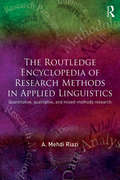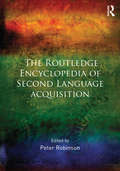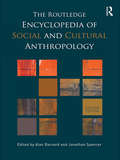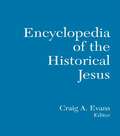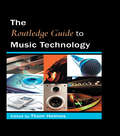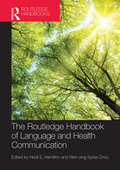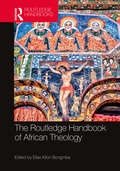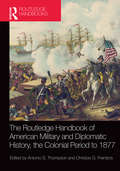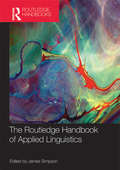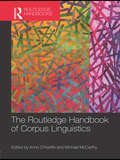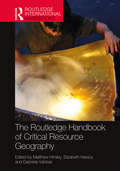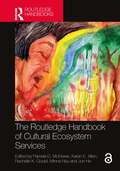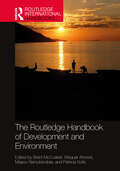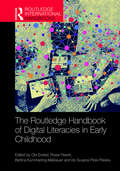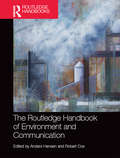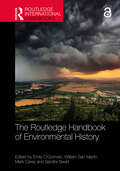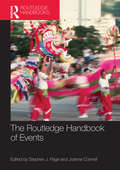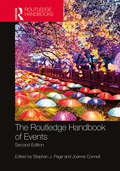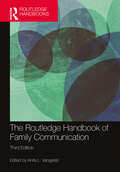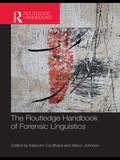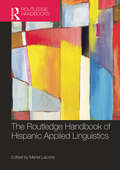- Table View
- List View
The Routledge Encyclopedia of Research Methods in Applied Linguistics
by A. Mehdi RiaziThe Routledge Encyclopedia of Research Methods in Applied Linguistics provides accessible and concise explanations of key concepts and terms related to research methods in applied linguistics. Encompassing the three research paradigms of quantitative, qualitative, and mixed methods, this volume is an essential reference for any student or researcher working in this area. This volume provides: A–Z coverage of 570 key methodological terms from all areas of applied linguistics; detailed analysis of each entry that includes an explanation of the head word, visual illustrations, cross-references to other terms, and further references for readers; an index of core concepts for quick reference. Comprehensively covering research method terminology used across all strands of applied linguistics, this encyclopedia is a must-have reference for the applied linguistics community.
The Routledge Encyclopedia of Second Language Acquisition
by Peter RobinsonThe Routledge Encyclopedia of Second Language Acquisition offers a user-friendly, authoritative survey of terms and constructs that are important to understanding research in second language acquisition (SLA) and its applications. The Encyclopedia is designed for use as a reference tool by students, researchers, teachers and professionals with an interest in SLA. The Encyclopedia has the following features: • 252 alphabetized entries written in an accessible style, including cross references to other related entries in the Encyclopedia and suggestions for further reading • Among these, 9 survey entries that cover the foundational areas of SLA in detail: Development in SLA, Discourse and Pragmatics in SLA, Individual Differences in SLA, Instructed SLA, Language and the Lexicon in SLA, Measuring and Researching SLA, Psycholingustics of SLA, Social and Sociocultural Approaches to SLA, Theoretical Constructs in SLA. • The rest of the entries cover all the major subdisciplines, methodologies and concepts of SLA, from “Accommodation” to the “ZISA project.” Written by an international team of specialists, the Routledge Encyclopedia of Second Language Acquisition is an invaluable resource for students and researchers with an academic interest in SLA.
The Routledge Encyclopedia of Social and Cultural Anthropology
by Alan Barnard Jonathan SpencerWritten by leading scholars in the field, this comprehensive and readable resource gives anthropology students a unique guide to the ideas, arguments and history of the discipline. The fully revised and expanded second edition reflects major changes in anthropology in the past decade.
The Routledge Encyclopedia of the Historical Jesus
by Craig A. EvansThis Encyclopedia brings together the vast array of historical research into the reality of the man, the teachings, the acts, and the events ascribed to him that have served as the foundational story of one of the world's central religions. This kind of historiography is not biography. The historical study of the Jesus stories and the transmission of these stories through time have been of seminal importance to historians of religion. Critical historical examination has provided a way for scholars of Christianity for centuries to analyze the roots of legend and religion in a way that allows scholars an escape from the confines of dogma, belief, and theological interpretation. In recent years, historical Jesus studies have opened up important discussions concerning anti-Semitism and early Christianity and the political and ideological filtering of the Jesus story of early Christianity through the Roman empire and beyond. Entries will cover the classical studies that initiated the new historiography, the theoretical discussions about authenticating the historical record, the examination of sources that have led to the western understanding of Jesus' teachings and disseminated myth of the events concerning Jesus' birth and death. Subject areas include: the history of the historical study of the New Testament: major contributors and their works theoretical issues and concepts methodologies and criteria historical genres and rhetorical styles in the story of Jesus historical and rhetorical context of martyrdom and messianism historical teachings of Jesus teachings within historical context of ethics titles of Jesus historical events in the life of Jesus historical figures in the life of Jesus historical use of Biblical figures referenced in the Gospels places and regions institutions the history of the New Testament within the culture, politics, and law of the Roman Empire.
The Routledge Guide to Music Technology
by Thom HolmesFirst published in 2006. This guide is an A to Z trade reference aimed at music students, technophiles and audio-video computer users. The world of music technology has exploded over the last decades thanks to introductions of new digital formats. At the same time there has been a renaissance in analog high fidelity equipment and resurgent interest in turntables, long playing records and vintage stereo systems. Music students, collectors and consumers will appreciate the availability of a guide to all things musical in the technological universe.
The Routledge Handbook of Language and Health Communication (Routledge Handbooks in Applied Linguistics)
by Heidi Hamilton Wen-ying Sylvia ChouThe Routledge Handbook of Language and Health Communication consists of forty chapters that provide a broad, comprehensive, and systematic overview of the role that linguistics plays within health communication research and its applications. The Handbook is divided into three sections: Individuals’ everyday health communication Health professionals’ communicative practices Patient-provider communication in interaction Special attention is given to cross-cutting themes, including the role of technology in health communication, narrative, and observations of authentic, naturally-occurring contexts. The chapters are written by international authorities representing a wide range of perspectives and approaches. Building on established work with cutting-edge studies on the changing health communication landscape, this volume will be an essential reference for all those involved in health communication and applied linguistics research and practice.
The Routledge Handbook of African Theology (Routledge Handbooks in Theology)
by Elias Kifon BongmbaTheology has a rich tradition across the African continent, and has taken myriad directions since Christianity first arrived on its shores. This handbook charts both historical developments and contemporary issues in the formation and application of theologies across the member countries of the African Union. Written by a panel of expert international contributors, chapters firstly cover the various methodologies needed to carry out such a survey. Various theological movements and themes are then discussed, as well as biblical and doctrinal issues pertinent to African theology. Subjects addressed include: • Orality and theology • Indigenous religions and theology • Patristics • Pentecostalism • Liberation theology • Black theology • Social justice • Sexuality and theology • Environmental theology • Christology • Eschatology • The Hebrew Bible and the New Testament The Routledge Handbook of African Theology is an authoritative and comprehensive survey of the theological landscape of Africa. As such, it will be a hugely useful volume to any scholar interested in African religious dynamics, as well as academics of Theology or Biblical Studies in an African context.
The Routledge Handbook of American Military and Diplomatic History: The Colonial Period to 1877
by Antonio S. Thompson and Christos G. FrentzosThe Routledge Handbook of American Military and Diplomatic History provides a comprehensive analysis of the major events, conflicts, and personalities that have defined and shaped the military history of the United States. This volume, The Colonial Period to 1877, illuminates the early period of American history, from the colonial warfare of the 17th century through the tribulations of Reconstruction. The chronologically organized sections each begin with an introductory chapter that provides a concise narrative of the period and highlights the scholarly debates and interpretive schools of thought in the historiography, followed by topical chapters on issues in the period. Topics covered include colonial encounters and warfare, the French and Indian War, the American Revolution, diplomacy in the early American republic, the War of 1812, westward expansion and conquest, the Mexican-American War, the Civil War, and Reconstruction. With authoritative and vividly written chapters by both leading scholars and new talent, this state-of-the-field handbook will be a go-to reference for every American history scholar's bookshelf.
The Routledge Handbook of Applied Linguistics (Routledge Handbooks in Applied Linguistics)
by James SimpsonThe Routledge Handbook of Applied Linguistics serves as an introduction and reference point to key areas in the field of applied linguistics. The five sections of the volume encompass a wide range of topics from a variety of perspectives: applied linguistics in action language learning, language education language, culture and identity perspectives on language in use descriptions of language for applied linguistics. The forty-seven chapters connect knowledge about language to decision-making in the real world. The volume as a whole highlights the role of applied linguistics, which is to make insights drawn from language study relevant to such decision-making. The chapters are written by specialists from around the world. Each one provides an overview of the history of the topic, the main current issues and possible future trajectory. Where appropriate, authors discuss the impact and use of new technology in the area. Suggestions for further reading are provided with every chapter. The Routledge Handbook of Applied Linguistics is an essential purchase for postgraduate students of applied linguistics. Editorial board: Ronald Carter, Guy Cook, Diane Larsen-Freeman and Amy Tsui.
The Routledge Handbook of Corpus Linguistics (Routledge Handbooks in Applied Linguistics)
by Anne O’KeeffeThe Routledge Handbook of Corpus Linguistics provides a timely overview of a dynamic and rapidly growing area with a widely applied methodology. Through the electronic analysis of large bodies of text, corpus linguistics demonstrates and supports linguistic statements and assumptions. In recent years it has seen an ever-widening application in a variety of fields: computational linguistics, discourse analysis, forensic linguistics, pragmatics and translation studies. Bringing together experts in the key areas of development and change, the handbook is structured around six themes which take the reader through building and designing a corpus to using a corpus to study literature and translation. A comprehensive introduction covers the historical development of the field and its growing influence and application in other areas. Structured around five headings for ease of reference, each contribution includes further reading sections with three to five key texts highlighted and annotated to facilitate further exploration of the topics. The Routledge Handbook of Corpus Linguistics is the ideal resource for advanced undergraduates and postgraduates.
The Routledge Handbook of Critical Resource Geography (Routledge International Handbooks)
by Gabriela Valdivia Matthew Himley Elizabeth HaviceThis Handbook provides an essential guide to the study of resources and their role in socio-environmental change. With original contributions from more than 60 authors with expertise in a wide range of resource types and world regions, it offers a toolkit of conceptual and methodological approaches for documenting, analyzing, and reimagining resources and the worlds with which they are entangled. The volume has an introduction and four thematic sections. The introductory chapter outlines key trajectories for thinking critically with and about resources. Chapters in Section I, "(Un)knowing resources," offer distinct epistemological entry points and approaches for studying resources. Chapters in Section II, "(Un)knowing resource systems," examine the components and logics of the capitalist systems through which resources are made, circulated, consumed, and disposed of, while chapters in Section III, "Doing critical resource geography: Methods, advocacy, and teaching," focus on the practices of critical resource scholarship, exploring the opportunities and challenges of carrying out engaged forms of research and pedagogy. Chapters in Section IV, "Resource-making/world-making," use case studies to illustrate how things are made into resources and how these processes of resource-making transform socio-environmental life. This vibrant and diverse critical resource scholarship provides an indispensable reference point for researchers, students, and practitioners interested in understanding how resources matter to the world and to the systems, conflicts, and debates that make and remake it.
The Routledge Handbook of Cultural Ecosystem Services
by Jun He Pamela D. McElwee Karen E. Allen Rachelle K. Gould Minna HsuThe Routledge Handbook of Cultural Ecosystem Services provides an overview of Cultural Ecosystem Services (CES), which are the nonmaterial aspects of benefits that people derive from nature. These diverse and multifaceted contributions can include experiences, capabilities, and identities, among others. The Handbook addresses how these CES are valued, how they reflect human-nonhuman relationships, and what roles they can play in improved human well-being, ecosystem management, and trajectories towards sustainability.This Handbook presents a wide array of perspectives on the roles CES can play in understanding relationships to nature, and on how those relationships might translate into policy. The Handbook includes philosophical approaches to CES, typologies and classifications of types of CES, and case studies of places, people, policies and projects engaging CES. Across seven distinctive Parts, the chapters deliver a number of important practical lessons on how to understand, measure, and value CES, and use examples and applications from around the world, including how CES apply across different biomes. The Handbook also includes a selection of compelling artworks that represent CES in different cultural contexts. The 91 authors represent 19 different countries, providing a rich range of experiences, including a strong focus on the Global South.This book can serve as a comprehensive guide to researchers who are new to CES and wish to understand more about the field, and as a set of go-to instructions for experienced CES researchers. It can also inform policymakers who wish to better incorporate CES into their work.The Open Access version of this book, available at http://www.taylorfrancis.com, has been made available under a Creative Commons Attribution-Non Commercial-No Derivatives (CC BY-NC-ND) 4.0 license
The Routledge Handbook of Development and Environment (Routledge International Handbooks)
by Maano Ramutsindela Waquar Ahmed Brent McCusker Patricia SolísThe handbook seeks to illuminate the key concepts in the study of development-environment through showcasing some of the Majoritarian (formerly "Developing") world’s emerging scholars in order to explore theoretical connections through critical/radical theory, “small” theory, various conceptual frameworks, and non-Western and subaltern viewpoints. The volume examines the themes around the study of the relationship between economic and social development and the environment. Part 1 covers theoretical and conceptual approaches to the study of development and environment by examining the diverse ways in which people perceive, understand, and act upon the world around them. Cross-scalar topics such as neo-liberalism and globalization, human rights, climate change, sustainability, and technology are covered in Part 2. The book shifts to examinations of resources and production in Part 3, where authors with a focus on one or more environmental resources or types of economic production are presented. Topics range from water, agriculture, and food, to energy, bioeconomy, and mining. The fourth section presents chapters where people are at the center of the development-environment nexus through topics such as gender relations, children, health, and cities. Finally, policy and governance of development and environment are explored in Part 5. The section includes both academics and practitioners who have worked with policy makers and are policy makers themselves. The book is primarily intended for scholars and graduate students in geography, environmental studies, and development studies for whom it will provide an invaluable and up-to-date guide to current thinking across the range of disciplines, which converge in the study of development and environment.
The Routledge Handbook of Digital Literacies in Early Childhood (Routledge International Handbooks of Education)
by Ola Erstad Rosie Flewitt Bettina Kümmerling-Meibauer Íris Susana Pires PereiraAs fast-evolving technologies transform everyday communication and literacy practices, many young children find themselves immersed in multiple digital media from birth. Such rapid technological change has consequences for the development of early literacy, and the ways in which parents and educators are able to equip today’s young citizens for a digital future. This seminal Handbook fulfils an urgent need to consider how digital technologies are impacting the lives and learning of young children; and how childhood experiences of using digital resources can serve as the foundation for present and future development. Considering children aged 0–8 years, chapters explore the diversity of young children’s literacy skills, practices and expertise across digital tools, technologies and media, in varied contexts, settings and countries. The Handbook explores six significant areas: Part I presents an overview of research into young children’s digital literacy practices, touching on a range of theoretical, methodological and ethical approaches. Part II considers young children’s reading, writing and meaning-making when using digital media at home and in the wider community. Part III offers an overview of key challenges for early childhood education presented by digital literacy, and discusses political positioning and curricula. Part IV focuses on the multimodal and multi-sensory textual landscape of contemporary literary practices, and how children learn to read and write with and across media. Part V considers how digital technologies both influence and are influenced by children’s online and offline social relationships. Part VI draws together themes from across the Handbook, to propose an agenda for future research into digital literacies in early childhood. A timely resource identifying and exploring pedagogies designed to bolster young children’s digital and multimodal literacy practices, this key text will be of interest to early childhood educators, researchers and policy-makers.
The Routledge Handbook of Environment and Communication
by Anders Hansen Robert CoxThis Handbook provides a comprehensive statement and reference point for theory, research and practice with regard to environment and communication, and it does this from a perspective which is both international and multi-disciplinary in scope. Offering comprehensive critical reviews of the history and state of the art of research into the key dimensions of environmental communication, the chapters of this handbook together demonstrate the strengths of multi-disciplinary and cross-disciplinary approaches to understanding the centrality of communication to how the environment is constructed, and indeed contested, socially, politically and culturally. Organised in five thematic sections, The Routledge Handbook of Environment and Communication includes contributions from internationally recognised leaders in the field. The first section looks at the history and development of the discipline from a range of theoretical perspectives. Section two considers the sources, communicators and media professionals involved in producing environmental communication. Section three examines research on news, entertainment media and cultural representations of the environment. The fourth section looks at the social and political implications of environmental communication, with the final section discussing likely future trajectories for the field. The first reference Handbook to offer a state of the art comprehensive overview of the emerging field of environmental communication research, this authoritative text is a must for scholars of environmental communication across a range of disciplines, including environmental studies, media and communication studies, cultural studies and related disciplines.
The Routledge Handbook of Environmental History (Routledge International Handbooks)
by Mark Carey Sandra Swart Emily O’Gorman William San MartínThe Routledge Handbook of Environmental History presents a cutting-edge overview of the dynamic and ever-expanding field of environmental history. It addresses recent transformations in the field and responses to shifting scholarly, political, and environmental landscapes. The handbook fully and critically engages with recent exciting changes, contextualizes them within longer-term shifts in the field, and charts potential new directions for study. It focuses on five key areas: Theories and concepts related to changing considerations of social justice, including postcolonial, antiracist, and feminist approaches, and the field’s growing emphasis on multiple human voices and agencies. The roles of non-humans and the more-than-human in the telling of environmental histories, from animals and plants to insects as vectors of disease and the influences of water and ice, the changing theoretical approaches and the influence of concepts in related areas such as animal and discard studies. How changes in theories and concepts are shaping methods in environmental history and shifting approaches to traditional sources like archives and oral histories as well as experiments by practitioners with new methods and sources. Responses to a range of current complex problems, such as climate change, and how environmental historians can best help mitigate and resolve these problems. Diverse ways in which environmental historians disseminate their research within and beyond academia, including new modes of research dissemination, teaching, and engagements with stakeholders and the policy arena. This is an important resource for environmental historians, researchers and students in the related fields of political ecology, environmental studies, natural resources management and environmental planning. Chapters 9, 10 and 26 of this book are freely available as a downloadable Open Access PDF at http://www.taylorfrancis.com under a Creative Commons Attribution-Non Commercial-No Derivatives (CC-BY-NC-ND) 4.0 license.
The Routledge Handbook of Environmental History (Routledge International Handbooks)
by Mark Carey Sandra Swart Emily O’Gorman William San MartínThe Routledge Handbook of Environmental History presents a cutting-edge overview of the dynamic and ever-expanding field of environmental history. It addresses recent transformations in the field and responses to shifting scholarly, political, and environmental landscapes.The handbook fully and critically engages with recent exciting changes, contextualizes them within longer-term shifts in the field, and charts potential new directions for study. It focuses on five key areas: Theories and concepts related to changing considerations of social justice, including postcolonial, antiracist, and feminist approaches, and the field’s growing emphasis on multiple human voices and agencies. The roles of non-humans and the more-than-human in the telling of environmental histories, from animals and plants to insects as vectors of disease and the influences of water and ice, the changing theoretical approaches and the influence of concepts in related areas such as animal and discard studies. How changes in theories and concepts are shaping methods in environmental history and shifting approaches to traditional sources like archives and oral histories as well as experiments by practitioners with new methods and sources. Responses to a range of current complex problems, such as climate change, and how environmental historians can best help mitigate and resolve these problems. Diverse ways in which environmental historians disseminate their research within and beyond academia, including new modes of research dissemination, teaching, and engagements with stakeholders and the policy arena. This is an important resource for environmental historians, researchers and students in the related fields of political ecology, environmental studies, natural resources management and environmental planning.Chapters 9, 10 and 26 of this book are freely available as a downloadable Open Access PDF at http://www.taylorfrancis.com under a Creative Commons Attribution-Non Commercial-No Derivatives (CC-BY-NC-ND) 4.0 license.
The Routledge Handbook of Environmental Movements (Routledge International Handbooks)
by Marco Giugni Maria GrassoThis handbook provides readers with up-to-date knowledge on environmental movements and activism and is a reference point for international work in the field. It offers an assessment of environmental movements in different regions of the world, macrostructural conditions and processes underlying their mobilization, the microstructural and social-psychological dimensions of environmental movements and activism, and current trends, as well as prospects for environmental movements and social change. The handbook provides critical reviews and appraisals of the current state of the art and future development of conceptual and theoretical approaches as well as empirical knowledge and understanding of environmental movements and activism. It encourages dialogue across the disciplinary barriers between social movement studies and other perspectives and reflects upon the causes and consequences of citizens’ participation in environmental movements and activities. The volume brings historical studies of environmentalism, sociological analyses of the social composition of participants in and sympathizers of environmental movements, investigations by political scientists on the conditions and processes underlying environmental movements and activism, and other disciplinary inquiries together, while keeping a clear focus within social movement theory and research as the main lines of inquiry. The handbook is an essential guide and reference point not only for researchers but also for undergraduate and graduate teaching and for policymakers and activists.
The Routledge Handbook of Environmental Movements (Routledge International Handbooks)
by Marco Giugni Maria GrassoThis handbook provides readers with up-to-date knowledge on environmental movements and activism and is a reference point for international work in the field. It offers an assessment of environmental movements in different regions of the world, macrostructural conditions and processes underlying their mobilization, the microstructural and social-psychological dimensions of environmental movements and activism, and current trends, as well as prospects for environmental movements and social change.The handbook provides critical reviews and appraisals of the current state of the art and future development of conceptual and theoretical approaches as well as empirical knowledge and understanding of environmental movements and activism. It encourages dialogue across the disciplinary barriers between social movement studies and other perspectives and reflects upon the causes and consequences of citizens’ participation in environmental movements and activities. The volume brings historical studies of environmentalism, sociological analyses of the social composition of participants in and sympathizers of environmental movements, investigations by political scientists on the conditions and processes underlying environmental movements and activism, and other disciplinary inquiries together, while keeping a clear focus within social movement theory and research as the main lines of inquiry.The handbook is an essential guide and reference point not only for researchers but also for undergraduate and graduate teaching and for policymakers and activists.
The Routledge Handbook of Events
by Stephen J. Page Joanne ConnellThe Routledge Handbook of Events explores and critically evaluates the debates and controversies associated with this rapidly expanding discipline. It brings together leading specialists from range of disciplinary backgrounds and geographical regions, to provide state-of-the-art theoretical reflection and empirical research on the evolution of the subject. It is the first major study to examine what events is as a discipline in the twenty-first century, its significance in contemporary society and growth as a mainstream subject area. The book is divided in to five inter-related sections. Section one evaluates the evolution of events as a discipline and defines what events studies is. Section two critically reviews the relationship between events and other disciplines such as tourism and sport. Section three focuses on the management of events, section four evaluates the impacts of events from varying political, social and environmental perspectives and section five examines the future direction of growth in event-related education and research. It offers the reader a comprehensive synthesis of this field, conveying the latest thinking and research. The text will provide an invaluable resource for all those with an interest in Events Studies, encouraging dialogue across disciplinary boundaries and areas of study.
The Routledge Handbook of Events
by Stephen J. Page Joanne ConnellThe Routledge Handbook of Events explores and critically evaluates the debates and controversies associated with the rapidly expanding domain of Event Studies. It brings together leading specialists from a range of disciplinary backgrounds, to provide a state-of-the-art review on the evolution of the subject. The first edition was a landmark study which examined how event research had evolved and developed from a range of different social science subject areas and disciplines. The Handbook was the first critique of the extent to which the subject had developed into a major area of social science inquiry. This second edition has been fully updated to reflect crucial developments in the field and includes brand new sections on ever-important aspects of Event Studies such as: anthropology, hospitality, seasonality, knowledge management, accessibility, diversity and human rights, as well as new studies on ‘the eventful city’ and the benefits of events in older life. The book is divided into four inter-related sections. Section 1 introduces and evaluates the concept of events. Section 2 critically reviews the relationship between events and other disciplines such as the contribution of economics, psychology and geography to the critical discourse of Event Studies. Section 3 focuses on the business, operational and strategic management of events, while the final section crucially focuses on critical events as a new paradigm within the burgeoning literature on Events. It offers the reader a comprehensive and critical synthesis of this field, conveying the latest thinking associated with events research, edited by two of the leading scholars in the field. The text will provide an invaluable resource for all those with an interest in Events Studies, encouraging dialogue that will span across disciplinary boundaries and other areas of study. It is an essential guide for anyone interested in events research.
The Routledge Handbook of Family Communication (ISSN)
by Anita L. VangelistiThis third edition again brings together interdisciplinary contributions to provide a comprehensive and multifaceted resource that reflects the breadth and depth of research on family communication and family relationships.Chapters continue to address theoretical and methodological issues influencing current conceptions of family and cover communication occurring in a variety of family forms and across social, cultural, and physical contexts.This third edition includes key updates, such as: The use and influence of social media and technology in families Parenting and communication in culturally and structurally diverse families Communication and physical health of family members Managing personal information about difficult topics in families The influence of the COVID-19 pandemic on family members This handbook is ideal for students and researchers interested in interpersonal and family communication, relationships, and family therapy within the disciplines of communication, social psychology, clinical psychology, sociology, and family studies.
The Routledge Handbook of Family Communication (Routledge Communication Series)
by Anita L. VangelistiThis third edition again brings together interdisciplinary contributions to provide a comprehensive and multifaceted resource that reflects the breadth and depth of research on family communication and family relationships. Chapters continue to address theoretical and methodological issues influencing current conceptions of family and cover communication occurring in a variety of family forms and across social, cultural, and physical contexts. This third edition includes key updates, such as: The use and influence of social media and technology in families Parenting and communication in culturally and structurally diverse families Communication and physical health of family members Managing personal information about difficult topics in families The influence of the COVID-19 pandemic on family members This handbook is ideal for students and researchers interested in interpersonal and family communication, relationships, and family therapy within the disciplines of communication, social psychology, clinical psychology, sociology, and family studies.
The Routledge Handbook of Forensic Linguistics (Routledge Handbooks In Applied Linguistics Ser.)
by Malcolm Coulthard Alison JohnsonThe Routledge Handbook of Forensic Linguistics provides a unique work of reference to the leading ideas, debates, topics, approaches and methodologies in Forensic Linguistics. Forensic Linguistics is the study of language and the law, covering topics from legal language and courtroom discourse to plagiarism. It looks at the linguist as expert providing evidence for the defence and prosecution, investigating areas from blackmail to trademarks and warning labels. The Routledge Handbook of Forensic Linguistics includes a comprehensive introduction to the field written by the editors and a collection of thirty-seven original chapters written by the world’s leading academics and professionals, both established and up-and-coming, designed to equip a new generation of students and researchers to carry out forensic linguistic research and analysis. The Routledge Handbook of Forensic Linguistics is the ideal resource for undergraduates or postgraduates new to the area. Malcolm Coulthard is Professor of Forensic Linguistics at Aston University, UK. Author of numerous publications, the most recent being An Introduction to Forensic Linguistics (co-authored with Alison Johnson, Routledge, 2007). Alison Johnson is Lecturer in Modern English Language at Leeds University, UK. Previous publications include An Introduction to Forensic Linguistics (co-authored with Malcolm Coulthard, Routledge, 2007). Contributors: Janet Ainsworth, Michelle Aldridge, Dawn Archer, Kelly Benneworth, Vijay Bhatia, Ronald R. Butters, Deborah Cao, Malcolm Coulthard, Paul Drew and Traci Walker, Bethany Dumas, Diana Eades, Susan Ehrlich, Fiona English, Tim Grant, Peter Gray, Gillian Grebler, Mel Greenlee, Sandra Beatriz Hale, Chris Heffer, Elizabeth Holt and Alison Johnson, Kate Howarth, Michael Jessen, Krzystof Kredens and Ruth Morris, Greg Matoesian, Gerald McMenamin, Frances Rock, Laura Felton Rosulek, Nancy Schweda-Nicholson, Roger Shuy, Lawrence Solan, Elizabeth Stokoe and Derek Edwards, Peter Tiersma, Tatiana Tkaèuková, David Walsh and Ray Bull, David Woolls, and Jerome Bruner.
The Routledge Handbook of Hispanic Applied Linguistics (Routledge Handbooks in Applied Linguistics)
by Manel LacorteThis book provides a comprehensive overview of Hispanic applied linguistics, allowing students to understand the field from a variety of perspectives and offering insight into the ever-growing number of professional opportunies afforded to Spanish language program graduates. The goal of this book is to re-contextualize the notion of applied linguistics as simply the application of theoretical linguistic concepts to practical settings and to consider it as its own field that addresses language-based issues and problems in a real-world context. The book is organized into five parts: 1) perspectives on learning Spanish 2) issues and environments in Spanish teaching 3) Spanish in the professions 4) the discourses of Spanish and 5) social and political contexts for Spanish. The book’s all-inclusive coverage gives students the theoretical and sociocultural context for study in Hispanic applied linguistics while offering practical information on its application in the professional sector.
